- Home
- Tamara Leigh
Merciless Page 3
Merciless Read online
Page 3
He gnashed his teeth. “Is he of noble blood?”
“He is—rather, was.” She nodded as if to force the clarification on herself. “Just as he was of your blood.”
It took Cyr no moment to understand, but he could not think how to respond.
The corners of her mouth rising in an expression too sorrowful to be a smile, she said, “Oui, on his sire’s side.”
Then he was born of a union between Norman and Saxon, the former likely drawn from one of the families who had long lived in England. If his father had sided with King Harold as seemed likely, he would forfeit all when Duke William ascended the throne—had he not already on the battlefield the same as his son.
“Who were you to him?” he asked.
“Were,” she breathed, then in a huskier voice, said, “Maid to his lady mother and, on occasion, his keeper.” A small sob escaped her. “As fell to me on the day past.”
Did she think herself responsible for his death?
“If only we had not come south. Had we remained in Wulfenshire as my lady…” She squeezed her lids closed, shook her head.
“Wulfenshire?” he turned the name over. Though during the fortnight since the duke’s army arrived on the shores of Sussex he had become familiar with the names of places within a day’s ride of their encampments, here was one he had not heard. Wondering if it was near Yorkshire where England’s usurping king had defeated Norwegian invaders days before the Norman landing and for safety’s sake her lady had brought her son south, he asked, “How far north?”
The woman’s eyes flew open, and there was alarm in their depths as of one surprised to find she was not alone. Then came resentment, and she dropped her chin and reached to her knife.
Cyr did not understand why he wished to know how the boy had come to be here, but what he did understand was it was not for him to question.
Huffing and grunting, the woman returned to driving her knife into the land to which she had been born. Again. And again.
He knew he ought to leave her, but he muttered, “God’s mercy!” and pulled her upright. As she drew breath to protest, he said, “Do you stand aside, the sooner we shall both be done here.”
“I do not need—”
“Stand aside!” He pushed her toward the boy, then it was her enemy on his knees. With one hand he plunged his blade into the ground, with the other scooped out displaced loam and rocks. Though reviled at making a tiller of soil one of two weapons that had elevated him above many a chevalier, there was satisfaction in the thrusts and twists that cleaned the blood from his blade as the wounded earth yielded up the depth he sought.
One foot, Cyr told himself, then I shall leave her to whatever fate she chooses.
So intent was he on a task unbecoming a man of the sword, once more he committed the deadly error of exposing his back to the enemy—not the woman but any number of her men lurking in the trees. However, not until he heard rustling leaves, skittering rocks, and labored breathing did he heed the voice urging him to attend to his surroundings.
Thrusting upright, he swept his dagger around. But as he closed a hand over his sword hilt, he recognized the one come unto him. The cause for the woman’s great draws of breath was the boy she carried, he who had tried to crawl back to his mother, he who had aided four others in severing Hugh’s life.
And whose young lives your uncle severed, his rarely examined conscience reminded. Mere boys.
Murderous boys, he silently countered, but with so little conviction it yet served, rousing anger better suited to the nephew of a dead man. “What do you?” he asked.
Near the boy Cyr had conveyed to the wood, she eased her burden to the ground, sat back on her heels, gripped her knees, and raised a face tracked with tears. “He also has a mother, as do the other three.”
Darkness once more rising through him, Cyr looked to the depression in which he stood. Did she expect him to enlarge it to accommodate all who had spilled Hugh’s life? Hugh who had yet to know such consideration? Hugh whose body might even now suffer plundering?
“It must be widened,” she said.
He thrust his dagger into its scabbard, said, “Not by my hand.”
She pushed upright. “Then by mine.”
“So be it.” If she had no regard for herself, why should he?
As he started past her, she said, “It would be a lie for me to thank you.”
He did not believe that. Not only had she drawn back from expressing appreciation earlier, but he sensed her declaration was an attempt to convince herself they were enemies. Still, it was good to be reminded they stood on opposite sides of the great fire set on the day past. Just as Normans would rebel against any who sought to yoke them, so would Saxons. Were the fire well enough fueled, it could rage for years across this island kingdom.
“Just as it would be a lie for me to welcome false gratitude,” he said and, assuring himself he would think no more on her, strode toward the battlefield.
“Norman!”
He cursed, turned.
Hitching her skirts clear of her slippers, she hastened forward and held out the psalter.
Cyr spared it no glance, instead looked nearer on a face the rising sun confirmed was as lovely as thought—so much he was tempted to brush aside blond tresses to view all of it. And she must have seen the temptation, wariness softening the hard light in her eyes and causing her to retreat a step.
Still, she extended the psalter. “Take it.”
He flicked his gaze over it, lingered over the blood. Was this spite? An attempt to bait him? Punish him? “For what?”
“Prayer and guidance, of which methinks you are in greater need than I.”
The warrior wanted to reject that, but the man who felt twisted and bent out of a shape so familiar as to be comfortable could not.
“It is in my language,” she said.
He frowned. “As I know less of the written than the spoken, of what use?”
She tilted her head, causing a tress to shift and expose more of her slender neck. “Do you and yours not learn the language of the conquered, how will you govern your new subjects?” She raised her eyebrows. “Or is that not your duke’s intent? Does he—do you—mean to kill us all?”
Baited, indeed. And yet he snapped at her hook. “It is not our intent!”
She thrust the psalter nearer. “I dare not ask for your word on that, but if you speak true, here is a good place to start—a means of enlightening your kind on how to rule those from whom you have stolen lives, hearts, even souls. And of course, let us not forget land.”
He could not. Though he wished to believe he and his younger brothers had accepted the invitation to join Duke William’s forces more for the Church than the possibility of becoming landed nobles the same as their father’s heir, it was a lie.
Perhaps that was what made him yield though the woman greatly offended—and further offended when their fingers brushed as he accepted the psalter.
She snatched her arm to her side and, setting her chin high, said, “Methinks you will not mind the stain, Norman.”
As if he rejoiced in the blood of her dead. As if he had not shown her mercy and compassion. As if he had not sought to protect her.
Anger his only comfort and defense, he flung the psalter at her feet. “Take that and be gone.”
She lowered her gaze, stared at her offering until raucous laughter sounded from the battlefield.
And so it began. “They come,” Cyr warned.
She shifted wide eyes to his, and he was glad for the abundance of fear if it meant she would leave. “So they do,” she said softly and turned away.
He stared after her as she moved toward the fallen youths. Though it was past time he left her, he longed for reassurance. “You will depart?” he called.
She stepped into the depression and began plying her knife. Were it only to accommodate the second boy, he would leave her to it, but if she intended to collect the other three…
As he strode fo
rward, he glanced at the psalter fallen open to a page of precise text on one side and a simply-rendered cross on the other.
Halting before her, he demanded, “Will you take yourself from here after these two are covered over?”
“I will not.”
He dropped to his haunches, but she continued to drive her blade into the ground. “For the love of God—if not yourself—leave the other boys!”
“Non.”
Then it is on her, he told himself. But when she stabbed her blade into the ground again, he closed a hand over her fist gripping the hilt. “Unlike your lady’s son, the others possess nothing worthy of plunder.”
Her head whipped up. “Still they could suffer desecration, and if their bodies are moved they may not be found again.” She swallowed loudly. “They must go home. They absolutely must. Now”—she jerked free—“collect your dead and leave me to mine.”
As she resumed her assault on the earth, Cyr straightened. Assuring himself he had done all he could to save her and vowing he would forget her, he strode opposite.
Chapter Three
As Cyr exited the wood, the sunlight streaming across the battlefield revealed in more shocking detail all who had fallen. Perhaps worse, the carnage come to light seemed to have no effect on those plundering the dead, most appearing as oblivious to the bodies underfoot as were ants to the grains of dirt over which they clambered. And step by step, the scavengers drew nearer Andredeswald.
“Lord,” Cyr rasped as he commanded his legs to carry him to his uncle, “I commend that woman into Your care. Let not spoils be made of her.”
Blessedly, his uncle was as he had left him, yet in possession of the medallion around his neck, chain mail tunic, scabbard-hung belt, and boots. But though Hugh’s sword was easily located, his dagger was not. Regrettable, it being a fine piece fashioned the same as those worn by all D’Argents, including Hugh’s son who might one day have passed his sire’s dagger to his own son.
Cyr hefted his uncle whose weight had grown more formidable these past years with the addition of fat that had surely lent to his downfall. Like the D’Argent heir, Hugh should have remained in Normandy. The painful irony of their accompaniment was they had not sought glory nor land but to fight side by side with younger kin to better ensure their survival. And now Hugh was dead and Cyr’s older brother might be as well.
“Accursed Saxons,” Cyr once more named the defeated, then shortened his stride to negotiate the massive number of bodies, the meadow’s eastern flank comprised of twice as many Saxons as Normans.
Burdened by his uncle, fatigue, and the horrors he waded amidst, relief swept him when he sighted his younger brother.
As Theriot neared, the bit of lightness about him—surely born of hope their uncle lived—slid down his face and sorrow more deeply dug the few lines there.
“Guarin?” Cyr demanded though fairly certain of the answer. Had their older brother been found, alive or dead, it would have been unnecessary to ask.
Theriot halted. “Non,” he said and offered no more as he settled his regard on their lifeless uncle. Relations between Hugh and him had been more strained than the older man’s relations with the other brothers owing to Theriot’s struggle with authority and penchant for revelry. But though he might not admit it, he had cared much for Hugh.
Keeping eyes lowered as if to conceal tears, he said, “I shall carry him.”
As Cyr relinquished the big man, he asked, “How fares Dougray?” The third brother who had come seeking land.
Despite Theriot possessing a leaner build and standing four fingers shorter than Cyr, he did not strain beneath Hugh’s weight. Settling the big man against his chest, he said, “The duke’s physician concurs the arm must be removed and tells it is best done when next Dougray loses consciousness.”
No shock, as mangled as it was, but Cyr had prayed it could be saved even if never again used to defend his brother’s person. “Then he has awakened.”
“Oui, and how he rages.”
Doubtless against Cyr—as he had every right to do.
Though Cyr longed to go to Dougray, as well as his cousin who would soon learn of his sire’s death, Guarin must be accounted for. “I shall continue my search for our brother.”
Theriot started to turn away, paused. “Dougray is a man, as a man determines his own path, as a man chose to accompany us. Remember that no matter what he casts at your feet.”
More likely upon my head, Cyr thought. “I thank you.”
As the burdened Theriot began forging a path across the battlefield, Cyr returned his thoughts to Guarin. Having last seen him in the company of their uncle, both swinging swords and thrusting spears from atop their destriers, he would resume his search where Hugh had fallen after being unhorsed.
Once more seeking D’Argent blue, he spared only a glance for the three remaining boys responsible for his uncle’s death—and determinedly withheld his thoughts from the woman intent on returning for their bodies.
But there was no ignoring his fellow warriors plundering Saxons and Normans alike. Whether or not Guarin yet lived, happily the scavengers would pick over the bounty offered by the D’Argent heir.
“Blue, Lord,” Cyr rasped. “Reveal our blue, else never will I find him.”
Over the next hour, as the sun warming the land furthered the stench and parted the shadows to cast light across the crimson of blood, silver of arms and armor, and brown of simple garments, Cyr searched. And prayed. For it, all he found was Hugh’s downed destrier a good distance from where the warrior breathed his last. No evidence of Guarin nor his mount.
Further fatigued by the effort to move and shift bodies each time blue was glimpsed, mouth parched and belly groaning for sustenance it would surely struggle to keep down amid the dead, Cyr leaned forward and braced his hands on his thighs.
“Where are you, Guarin?” he grated. “I cannot return to France without word of what befell you.” Though their mother would prefer to remain ignorant of her eldest son’s fate that she cling to the hope he lived, if never Guarin was found it could prove more painful—and cruel. As for their father, he would be pained by the possibility of losing a son but anxious over his successor. Were Guarin lost, the heir would become Cyr who had joined Duke William to win lands of his own, not displace his brother.
A scream straightened his spine, and though he could not have said whence it issued, he sped his gaze to where he had found his uncle. Though he had ventured a good distance, he recognized the one who thrust an arm before her and saw light glint off the blade with which she threatened her enemy.
Guessing the two men meant to make plunder of her, Cyr snarled, “Fool woman,” and drew his sword and ran.
As he neared, he heard her cry in Norman French, “Savages! Barbarians!”
The two laughed and dropped sacks whose bulging contents were looted from the dead.
As one moved toward her left flank, the other her right, she swept the blade side to side. Blond hair falling about face and shoulders, she spat, “Despoilers!”
“So we are, Wench.” That one’s guttural voice was familiar to Cyr, as were broad shoulders that were a poor match for narrow hips and thin legs.
The woman retreated a step, in her own language insulted them as first she had done Cyr. “Nithings!”
“Hear that?” called Campagnon’s companion. “She names cowards those standing on the backs of men who cried out to their mothers as we watered the earth with their blood. A lesson in respect would do this Saxon good, do you not think?”
For answer, Campagnon lunged.
The woman’s blade arced, and her attacker reeled back and clapped a hand over his face.
Naming her the foulest of those female, Campagnon’s companion set himself at her.
She had no moment to recover—other than what Cyr provided.
Bellowing, he thrust his sword to the right of the man, snatched the back of his tunic, and flung him aside. Sparing the woman no glance, he swept arou
nd and saw Campagnon’s companion land hard alongside a Norman archer whose empty quiver was aslant on his shoulders and bow just visible beneath his lifeless body.
Though aware the Saxon woman was once more at his back with a blade in hand and, confronted by three of her enemy, had more cause than earlier to wield it against him, it was his own against whom he must defend himself.
“You trespass, knave!” Campagnon shouted.
Cyr shifted his regard to him, from the amount of blood flowing from the gash across nose and cheek was certain he would scar, evidencing he had been bettered by a woman—and a Saxon at that.
“Campagnon,” Cyr acknowledged as, out of the corner of his eye, he watched the miscreant’s companion stumble upright.
Raymond Campagnon frowned, then his eyes widened and scorn curled his lips. “Cyr D’Argent. Merciless Cyr.”
Though the byname was earned at contest and battle and Cyr wore it with quiet pride, it suddenly hung heavy and foul for what it revealed of him to the Saxon woman. Much of it true.
Campagnon looked to his companion. “You have heard of him. Eh, Merle?”
“I have, but surely one who thinks to show mercy to a woman—our enemy—cannot be the same.”
Campagnon chuckled. “Perhaps he does not show mercy—but wishes her for himself.”
“Leave,” Cyr growled.
Campagnon dragged an arm across nose and cheek, considered the blood trailing his sleeve, then set a hand on his sword hilt. “After I take the flesh owed me.” His eyes flicked to her.
Silently, Cyr cursed the woman for not taking the opportunity to flee. “You shall not lay hands on her,” he warned.
Campagnon blinked wide. “Else what? You will take up arms against your fellow warrior to defend a filthy little Saxon who insults her Norman betters? Now her masters?”
“You are not—will never be—my masters!” she cried. “You who tear at the dead like vultures, bathing your claws in their blood! You are heathens! Nithings!”

 FEARLESS: Book Two: Age of Conquest
FEARLESS: Book Two: Age of Conquest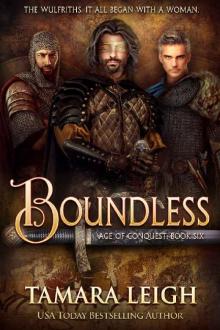 BOUNDLESS: A Medieval Romance (AGE OF CONQUEST Book 6)
BOUNDLESS: A Medieval Romance (AGE OF CONQUEST Book 6)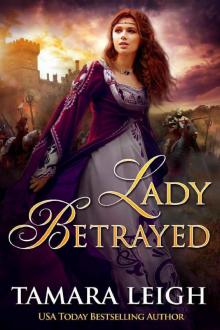 Lady Betrayed
Lady Betrayed Merciless
Merciless Nowhere, Carolina
Nowhere, Carolina Virgin Bride
Virgin Bride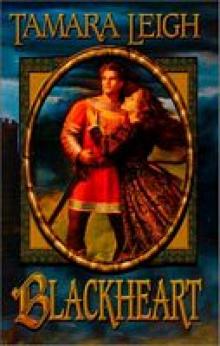 Blackheart
Blackheart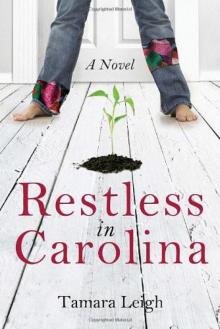 Restless in Carolina
Restless in Carolina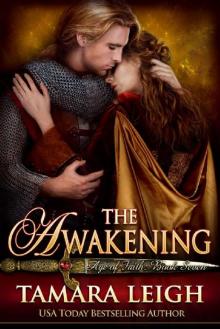 THE AWAKENING_A Medieval Romance
THE AWAKENING_A Medieval Romance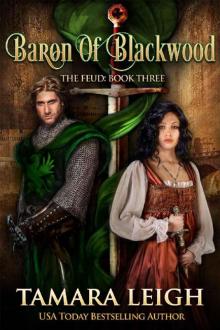 Baron of Blackwood
Baron of Blackwood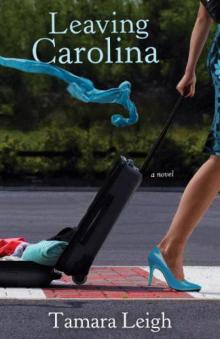 Leaving Carolina
Leaving Carolina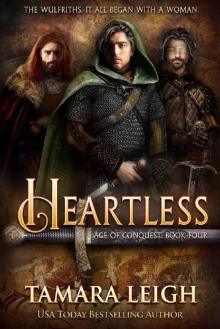 HEARTLESS: A Medieval Romance (Age of Conquest Book 4)
HEARTLESS: A Medieval Romance (Age of Conquest Book 4)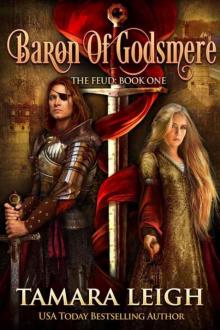 Baron of Godsmere
Baron of Godsmere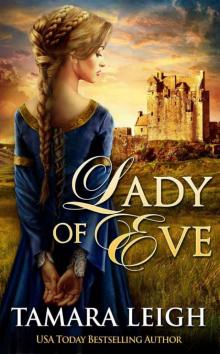 Lady Of Eve
Lady Of Eve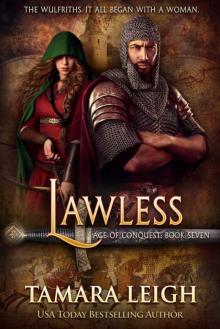 LAWLESS: A Medieval Romance (AGE OF CONQUEST Book 7)
LAWLESS: A Medieval Romance (AGE OF CONQUEST Book 7)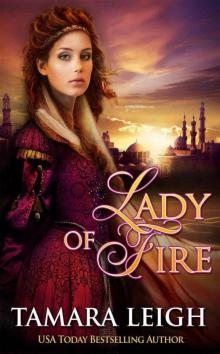 Lady Of Fire AKA Pagan Bride
Lady Of Fire AKA Pagan Bride The Yielding (Age of Faith)
The Yielding (Age of Faith) The Redeeming: Book Three (Age of Faith)
The Redeeming: Book Three (Age of Faith)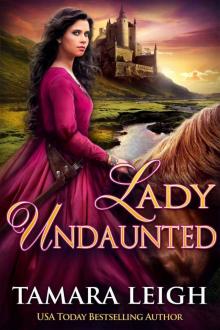 LADY UNDAUNTED: A Medieval Romance
LADY UNDAUNTED: A Medieval Romance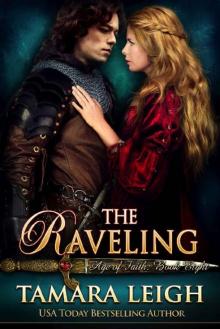 THE RAVELING: A Medieval Romance (Age of Faith Book 8)
THE RAVELING: A Medieval Romance (Age of Faith Book 8)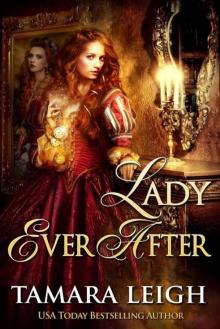 LADY EVER AFTER: A Medieval Time Travel Romance (Beyond Time Book 2)
LADY EVER AFTER: A Medieval Time Travel Romance (Beyond Time Book 2)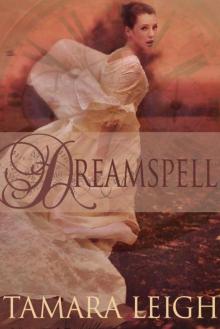 Dreamspell
Dreamspell The Unveiling (Age of Faith)
The Unveiling (Age of Faith)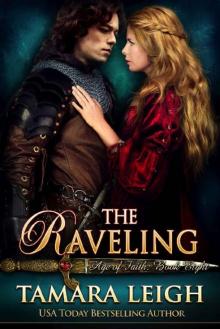 THE RAVELING
THE RAVELING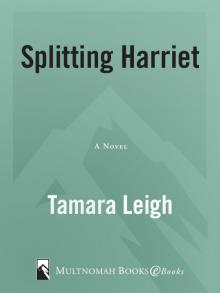 Splitting Harriet
Splitting Harriet Age of Faith 4 - The Kindling
Age of Faith 4 - The Kindling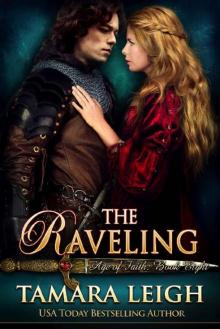 THE RAVELING_A Medieval Romance
THE RAVELING_A Medieval Romance Perfecting Kate
Perfecting Kate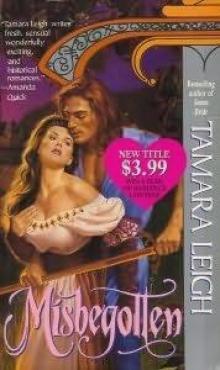 Misbegotten
Misbegotten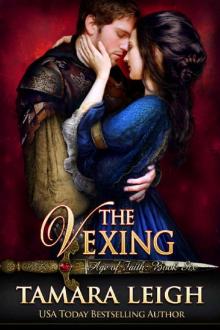 THE VEXING: A Medieval Romance (AGE OF FAITH Book 6)
THE VEXING: A Medieval Romance (AGE OF FAITH Book 6)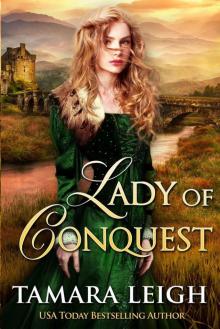 LadyOfConquest:SaxonBride
LadyOfConquest:SaxonBride